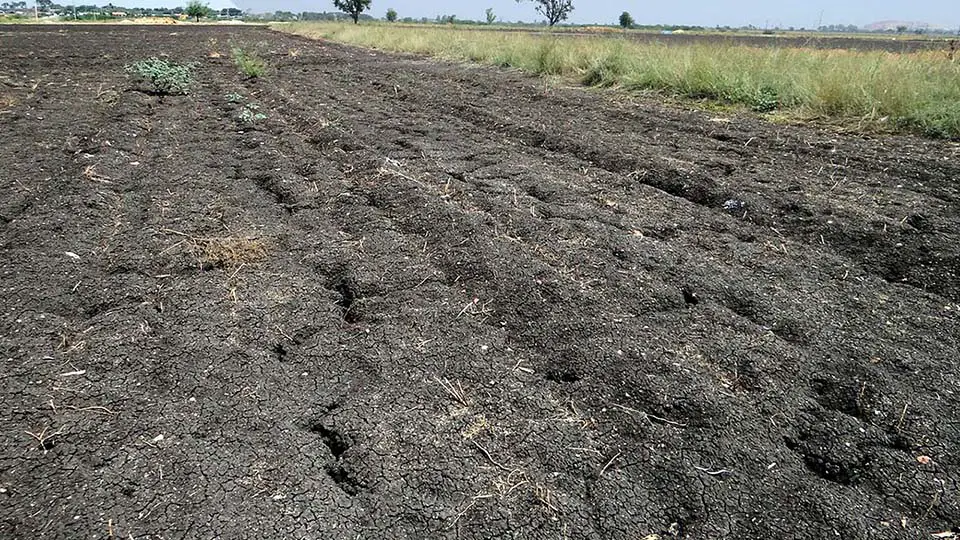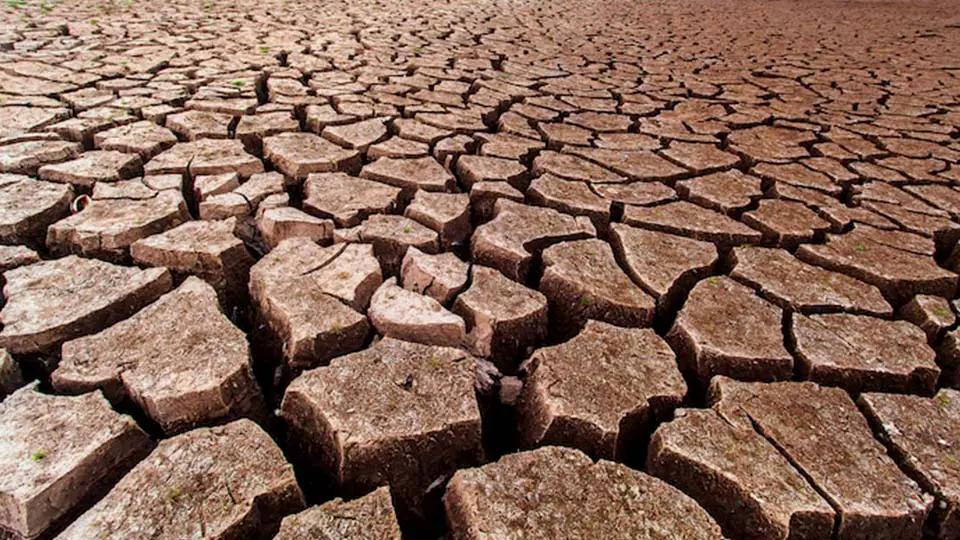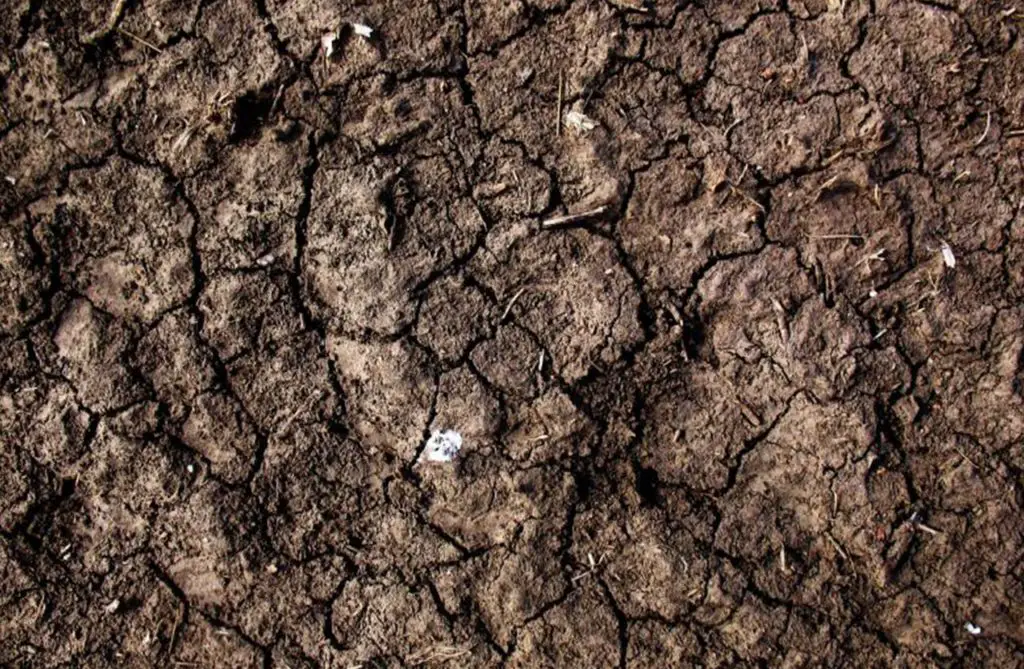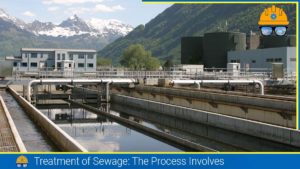There are several types of soil in and around the world which exhibit different physical and mechanical properties. Some soil shows excellent engineering properties while others offer challenges to the engineering application and usage. One such example is black cotton soil. In this article, black cotton soil is discussed.
What is Black Cotton Soil?
Black cotton soil (BC Soil), also known as black clay soil, expansive soil or regur soil, is a type of soil that is widely distributed worldwide, particularly in parts of Australia, India and Africa. It is characterized by its high clay content (above 50%) and dark colour, which gives it the name “black cotton soil.” Such soil swells during the rainy season and cracks in summer due to shrinkage.
The swelling of BC soil is due to its high clay content, which makes it highly absorbent. When it receives rainfall, the soil absorbs water and undergoes significant swelling. This swelling can cause the soil to expand in volume, leading to increased soil moisture content.
As in summer, it tends to lose the absorbed water due to hot and dry periods which leads to the development of cracks and shrinkage in the volume of soil. These shrinkage cracks are 100 mm to 150 mm wide and 0.5 m to 2 m deep.

Types of Black Cotton Soil
- Shallow Black Soil (Murrum):
- This soil variety is well-suited for growing cotton, gram, wheat, and rice.
- Shallow black soils have a thickness of less than 30 cm.
- They consist of 40%-60% clay content.
- Medium Black Soil (Murrum):
- This type of black soil has a medium texture and is often referred to as “murrum” in some regions.
- It is less clayey compared to the heavier types of black cotton soil.
- Murrum is commonly used in road construction and as a building material in certain areas.
- Heavy Black Soil:
- This is the typical black cotton soil characterized by its high clay content.
- Heavy black soil has good fertility due to the presence of minerals and nutrients, making it suitable for agriculture.
- It also exhibits significant shrink-swell properties, leading to challenges in construction and infrastructure development.
black cotton soil properties
Black cotton soil possesses distinct engineering properties that need to be considered in construction and geotechnical projects. These properties include its high clay content, significant swelling and shrinking behaviour, low shear strength, high plasticity, low permeability, and susceptibility to erosion. With a clay content typically exceeding 50% by weight, BC soil exhibits significant volume changes as it absorbs water and swells, leading to potential issues such as foundation movement and cracking.
Its low shear strength and high plasticity make the soil prone to deformation and instability, particularly when saturated or highly moist. Additionally, the soil’s low permeability causes slow water drainage and can result in waterlogging and poor drainage conditions. The high clay content and low permeability also render BC soil susceptible to erosion, especially during heavy rainfall or exposure to flowing water.
It is crucial to consider site-specific conditions, conduct thorough site investigations, and consult reliable geotechnical engineering references or research papers to obtain accurate and detailed information regarding the engineering properties of black cotton soil.
Engineering properties Of black cotton soil
| Properties | Result | Limit |
|---|---|---|
| Specific Gravity | 2.72 | 2.65-2.8 |
| Liquid Limit | 53% | 40-100 |
| Plastic Limit | 20.38% | – |
| Plasticity Index | 32.62% | – |
| Maximum Dry Density | 1.58g/cc | 1.59 |
| Optimum Moisture Content | 20% | – |
| California Bearing Ration (CBR) Value | 2.39% | – |
| Unconfined Compression Value (UCC) | 37.52kN/m | – |

Chemical Composition of Black Cotton Soil:
The chemical compositions of black cotton soil are tabulated below
| Chemical composition | Value |
|---|---|
| pH value | >7 (Alkaline) |
| Organic Content | 0.4-204% |
| CaCO3 | 1-15% |
| SiO2 | 50-55% |
| SiO2, Ai2O3 | 3-5% |
| Montmorrilonite Mineral | 30-50% |
Characteristics of Black Cotton Soil:
- Clay content: Black cotton soil has a high percentage of clay, typically more than 50% by weight. This clay content gives the soil its unique properties and characteristics.
- Swelling and shrinking: It exhibits significant volume changes with variations in moisture content. When it absorbs water, it swells and expands, and when it dries out, it shrinks. This property can cause problems for construction and agriculture.
- Water retention: Due to its high clay content, such soil has good water retention capacity. It can hold water for extended periods, making it suitable for certain crops but problematic for others.
- Low permeability: The dense clay particles in BC soil result in low permeability, meaning water drains slowly through the soil. This can lead to waterlogging and poor drainage conditions.
- Fertility: BC soil is typically fertile and can support the growth of certain crops. However, its physical properties, such as high shrinkage and low permeability, can pose challenges for agriculture.
- Construction challenges: BC soil is notorious for its tendency to shrink and swell, which can cause damage to structures. It is highly expansive when wet and can cause cracks in foundations, roads, and buildings. Therefore, special construction techniques and precautions are required in areas with black cotton soil.
- Soil stabilization: Various techniques can be used to stabilize BC soil for construction purposes, such as adding lime, cement, or other stabilizing agents to improve its engineering properties.
Stabilizing Black Cotton Soil:
When dealing with black cotton soil, engineers and geotechnical experts must carefully evaluate its unique engineering properties. Measures like soil stabilization using additives such as lime or cement may be necessary to enhance the load-bearing capacity and reduce its susceptibility to swelling and shrinking. There are several methods and techniques for stabilizing BC soil. Some of the popular stabilizing methods are the use of fly ash, granite dust, cement, chemicals, bitumen, etc.

Lime Stabilization:
Lime stabilizes BC soil, increasing its strength and durability while minimizing moisture variation. The lime quantity depends on soil particle surface area, and fine-grained soils may require up to 15% by weight. Lime improves workability and volume stability by making the clay more friable through flocculation. It also increases the optimum water content for compaction and the soil’s strength, durability, and resistance to traffic, water, wind, and freeze-thaw cycles.
Cement Stabilization:
This process enhances the load-bearing capacity of BC soil, reduces plasticity, and increases resistance to volume changes. Cement stabilization enhances shear strength, reduces swelling potential, and improves overall stability, making the soil suitable for applications like foundations, roads, and slopes.
Also, read: Soil Contamination: Causes, Ways Of Spreading & Removal
Types of Foundation In Black Cotton Soil
In case the depth of black cotton soil is greater, the following type of foundation may be provided
- Strip or pad foundation
- Pier foundation with arches and
- Under reamed pile foundation.
Also, read: Different Types Of Foundations Used In Construction
FAQs
Q: What is Black Cotton Soil?
A: Black cotton soil, also called black soil or regur soil, is a clayey soil found worldwide. It is named for its black colour and moisture-retention properties similar to cotton fibres. The soil mainly consists of clay minerals, especially montmorillonite, giving it unique characteristics. Its expansive nature leads to substantial volume changes with moisture fluctuations, causing foundation failures, structural damage, and challenges in road and building maintenance.
Q: Why is black cotton soil called “black cotton”?
A: It derives its name from its black colour, which resembles the colour of cotton fibres, and its ability to retain moisture like cotton.
Q: What are the main components of black cotton soil?
A: Black cotton soil is primarily composed of clay minerals, particularly montmorillonite, which gives it its unique properties.
Q: How can the properties of black cotton soil improve for engineering applications?
A: Black cotton soil, with its expansive nature, can pose challenges for engineering applications. However, there are several techniques that can be employed to improve its properties and make it more suitable for construction:
1. Soil Stabilization
2. Compaction:
3. Geosynthetics
4. Applying proper Foundation Design
5. Soil Replacement
References:
- Bhavikatti, S. S. (2010). Basic civil engineering. IK International Publishing House Pvt. Ltd.
- Thanappan, S. (2023, January 1). Characteristics of Black Cotton Soil. https://www.academia.edu/95723212/Characteristics_of_Black_cotton_Soil
- Ikeagwuani, C., Obeta, I., & Agunwamba, J. (2019). Stabilization of black cotton soil subgrade using sawdust ash and lime. Soils and Foundations, 59(1), 162-175. https://doi.org/10.1016/j.sandf.2018.10.004
- Liu, Y., Chang, C., Namdar, A., She, Y., Lin, C., Yuan, X., & Yang, Q. (2019). Stabilization of expansive soil using cementing material from rice husk ash and calcium carbide residue. Construction and Building Materials, 221, 1-11. https://doi.org/10.1016/j.conbuildmat.2019.05.157
- Mishra, B. (November 2015). Study on Engineering Behavior of Black Cotton Soil and its Stabilization by Use of Lime. ISSN (Online): 2319-7064
- Oza, J., & Gundaliya, P. (2013). Study of Black Cotton Soil Characteristics with Cement Waste Dust and Lime. Procedia Engineering, 51, 110-118. https://doi.org/10.1016/j.proeng.2013.01.017
![]()







